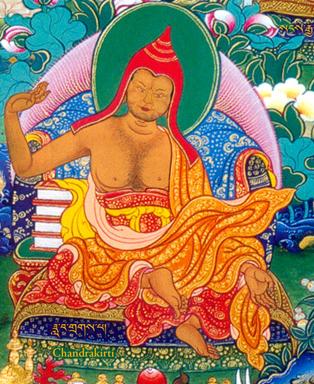Chandrakirti: Difference between revisions
Jump to navigation
Jump to search
m (→External Links) |
mNo edit summary |
||
| Line 16: | Line 16: | ||
*Kevin A. Vose, ''Resurrecting Candrakirti—Disputes in the Tibetan Creation of Prasangika'' (Boston: Wisdom Publications, 2008). | *Kevin A. Vose, ''Resurrecting Candrakirti—Disputes in the Tibetan Creation of Prasangika'' (Boston: Wisdom Publications, 2008). | ||
*Lobsang N. Tsonawa, ''Indian Buddhist Pandits from The Jewel Garland of Buddhist History'' (Dharamsala: Library of Tibetan Works and Archives, 1985). | *Lobsang N. Tsonawa, ''Indian Buddhist Pandits from The Jewel Garland of Buddhist History'' (Dharamsala: Library of Tibetan Works and Archives, 1985). | ||
==Internal Links== | |||
* [[Quotations: Indian Masters#Candrakīrti|Quotations from Candrakīrti's ''Introduction to the Middle Way'']] | |||
==External Links== | ==External Links== | ||
Revision as of 13:50, 21 November 2011

Chandrakirti (Skt. Candrakīrti; Tib. ཟླ་བ་གྲགས་པ་, Dawa Drakpa; Wyl. zla ba grags pa) — a renowned Indian scholar who was born in the early seventh century. He is the author of Introduction to the Middle Way (Tib. དབུ་མ་ལ་འཇུག་པ་, Uma la jukpa), Clear Words (Tib. ཚིག་གསལ་, Tsik sal) and other key works of the Prasangika Madhyamika.
Writings
His major writings include:
- Clear Words
- Commentary on the Four Hundred Verses on the Yogic Deeds of Bodhisattvas
- Commentary on the Seventy Stanzas on Emptiness
- Commentary on the Sixty Stanzas on Reasoning
- Introduction to the Middle Way
- Seventy Verses on Taking Refuge
Further Reading
- Cesare Rizzi, Candrakīrti (Delhi: Motilal Banarsidass, 1988).
- David Seyfort Ruegg, The Literature of the Madhyamaka School of Philosophy in India (Wiesbaden: Harrassowitz, 1981).
- Kevin A. Vose, Resurrecting Candrakirti—Disputes in the Tibetan Creation of Prasangika (Boston: Wisdom Publications, 2008).
- Lobsang N. Tsonawa, Indian Buddhist Pandits from The Jewel Garland of Buddhist History (Dharamsala: Library of Tibetan Works and Archives, 1985).